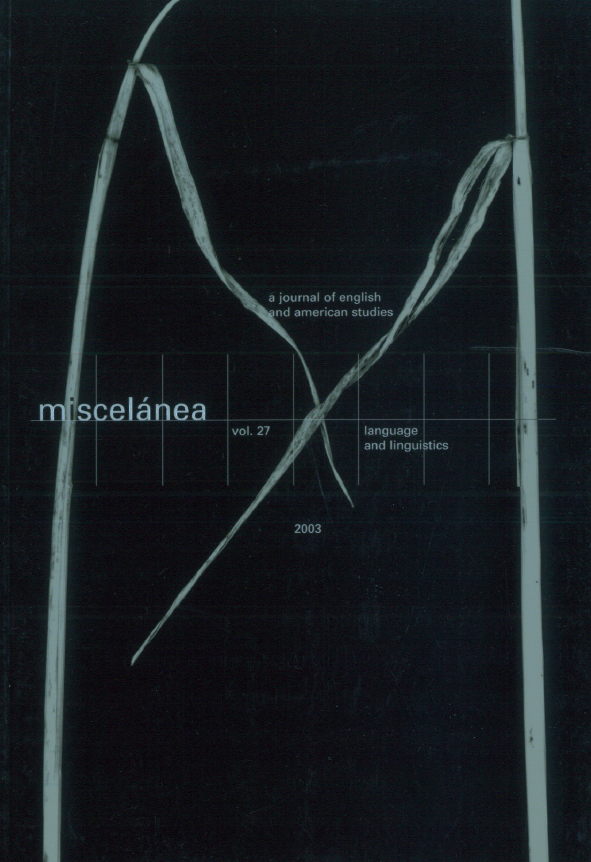Primeras aproximaciones al inexplorado dialecto de Sunderland
DOI:
https://doi.org/10.26754/ojs_misc/mj.200310399Palabras clave:
dialectología, inglés de Sunderland, inglés de Tyneside o Newcastle, vocabulario dialectal, identidadResumen
A diferencia del inglés de Tyneside o Newcastle, que ha sido estudiado en profundidad, el inglés de Sunderland puede considerarse un dialecto olvidado en el noreste de Inglaterra, una laguna que se hace necesario llenar. El inglés de Sunderland es una variedad urbana relativamente joven que a menudo se confunde con el inglés de Tyneside. Uno de sus usos es distinguir a sus hablantes, los Mackems, para diferenciarse de los Geordies (es decir, los habitantes de Newcastle) y reflejar su fuerte identidad local. Así pues, este artículo abordará en primer lugar algunas cuestiones sociales que explican la rivalidad entre geordies y mackems. A continuación, se examinarán algunos datos de mi investigación de maestría sobre el vocabulario dialectal de Sunderland y Newcastle, en la que se investigó hasta qué punto ciertas palabras dialectales tradicionales registradas en la zona por el Survey of English Dialects resultan familiares a los adolescentes de hoy en día. Se encontraron similitudes y diferencias entre el léxico dialectal de Sunderland y Newcastle, pero sobre todo se evidenció que el inglés de Sunderland necesita ser estudiado a fondo, ya que es probable que surjan más diferencias. Éste es precisamente el siguiente paso de mi investigación.
Descargas
Referencias
BEAL, Joan. C. 1993a. “The Grammar of Tyneside and Northumbrian English”. In Milroy, J. and Milroy, L. (eds.). Real English:
the Grammar of English Dialects in the British Isles. London: Longman: 187-213.
—. 1993b. “Geordie accent and grammar”. Unpublished MS, DELLS, University of Newcastle, Newcastle upon Tyne.
—. 2000. “From Geordie Ridley to Viz: popular literature in Tyneside English”. Language and Literature 2000, 9 (4).
—. Forthcoming. “‘Geordie Nation’ Language and Regional Identity in the North-east of England”. Lore and Language 16.
BEAL, Joan. C. and Christine MCDONALD. 1987. “Modal verbs in Tyneside English”. Journal of the Atlantic Provinces Linguistic Association, 9: 42-55.
BURBANO, Lourdes. 2001. Lexical Erosion and Lexical Innovation in Tyne and Wear. Unpublished MLit dissertation, Department of English Linguistics and Literary Studies, University of Newcastle upon Tyne.
COUPLAND, Nikolas. 1992. Dialect in Use. Clevedon: Multilingual Matters.
FRANCIS, W. Nelson. 1983. Dialectology: An Introduction, London and New York: Longman.
LLAMAS, Carmen. 1999. “A New Methodology: Data Elicitation for Social and Regional Language Variation Studies”. Leeds Working Papers in Linguistics and Phonetics, 7: 95-118.
—. 2000. “Middlesbrough English: Convergent and divergent trends in a part of England with no identity”. Newcastle and Durham Working Papers in Linguistics 8. URL: http://www.leeds.ac.uk/linguistics/research/research.htm
MCDONALD, Christine. 1981. Variation in the Use of Modal Verbs with Special Reference to Tyneside English. Unpublished University of Newcastle PhD. Thesis.
MILROY, James, Lesley MILROY and Sue HARTLEY. 1994. “Local and supra-local change in British English. The case of glottalisation”. English World-Wide 15(1): 1-33.
OPIE, Iona and Peter OPIE. 1959. The Lore and Language of Schoolchildren. Oxford: Clarendon Press.
ORTON, Harold and Eugen DIETH. 1962-1971. Survey of English Dialects. Leeds: Arnold.
PELLOWE, John et al. 1972. “A dynamic modelling of linguistic variation: the urban (Tyneside) Linguistic Survey”. Lingua 30: 1-30.
ROBINSON, F. (ed.). 1988. Post-Industrial Tyneside. An Economic and Social Survey of Tyneside in the 1980s. Newcastle upon Tyne: Newcastle upon Tyne City Libraries and Arts.
SIMMELBAUER, Andrea. 2000. The Dialect of Northumberland. A Lexical Investigation. Heidelberg: Universitätsverlag C. Winter. The Oxford English Dictionary. 1989. (2nd ed.) Oxford: Clarendon Press.
WATT, Dominic and Lesley MILROY. 1999. “Patterns of variation and change in three Newcastle vowels: Is this dialect levelling?”. Foulkes, P and G. Docherty. (eds.). Urban Voices. Accent Studies in the British Isles. London: Arnold: 25-46.
WRIGHT, Joseph. 1896-1905. The English Dialect Dictionary. London: Henry Frowde, Amen Corner, E. C.
NEWSPAPERS
The Guardian, (26-9-1979) “If London wasn’t London, Sunderland would be”.
The Independent (19-8-1992) “Fan’s eye view: Agog on the Tyne”: 26.
E-REFERENCES
http://www.ncl.ac.uk/elll/research/language/npecte.htm
http://www.sunderland.gov.uk/public/editable/themes/theCity/CityHeritage.asp
Descargas
Publicado
Número
Sección
Licencia
Derechos de autor 2003 Lourdes Burbano Elizondo

Esta obra está bajo una licencia internacional Creative Commons Atribución-NoComercial 4.0.


